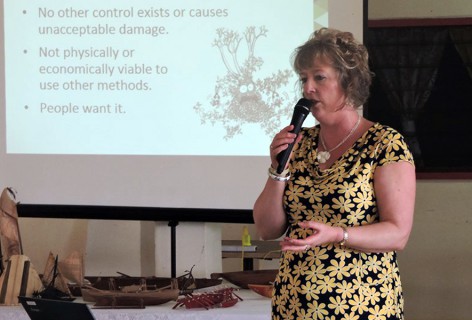Members of Manaaki Whenua – Landcare Research’s Pacific Natural Enemies Natural Solutions team were in Tuvalu this week with a colony of leaf-feeding psyllids, Heteropsylla cubana.
Programme leader Ms Lynley Hayes says the team worked with Tuvalu’s National Invasive Species co-ordinator Sam Panapa to release the psyllid at suitable sites.
Mr Panapa says the importance of this project lies in its assistance to Tuvalu in identifying invasive weeds and promoting the use of natural enemies. “This method is safer than using chemicals, as they do not harm other desirable species or cause other unwanted issues. No other plants in Tuvalu are at risk.”
Ms Hayes says laboratory research at Manaaki Whenua has shown the psyllids quickly destroyed the growing tips of small potted plants grown from seed sent from Tuvalu. “The psyllids can rapidly kill seedlings of susceptible leucaena plants, while repeated attacks lead to defoliation and occasionally the death of large plants.”
At a recent prioritisation workshop with stakeholders held in Tuvalu finding better ways to control leucaena was identified as a top priority. This psyllid, which is native to tropical America has become established through much of the Pacific, only feeds on plants within the Leucaena genus.
Manaaki Whenua Biocontrol Technician Stephanie Morton says the psyllids passed all their tests and were given a clean bill of health ahead of the trip. “We were so excited to get them to their new home,” she says. “It has been a privilege to work with Tuvalu and provide the technology that allows them to safeguard their ecosystems and protect their biodiversity in a sustainable and cost-effective way.”
Tuvaluans who are interested to see the psyllids at work will, in the future, if they look really closely, see what look like breadcrumbs sprinkled on the leaves of the tree. “This is due to amixture of all the life stages, white skins shed during moulting, and honeydew droplets produced by the tiny psyllids during feeding,” says Ms Hayes.
The psyllid’s impact post release in Tuvalu will be closely monitored.
Leucaena was widely introduced across the Pacific as an agroforestry crop, however it has quickly become an aggressive invader in many tropical and sub-tropical regions and is listed as one of the 100 of the world’s worst invasive alien species. The tree can form dense thickets that are difficult to eradicate once established, crowding out native plants and making areas inaccessible.
![Manaaki Whenua biocontrol technician Stephanie Morton packing up a colony of leaf-feeding psyllids [Heteropsylla cubana] ahead of the trip to Tuvalu Image](/assets/News/Manaaki-Whenua-Biocontrol-Technician-Stephanie-Morton-packing-up-colony-of-leaffeeding-psyllids-Heteropsylla-cubana-ahead-of-the-trip-to-Tuvalu__FillMaxWzE1LDE1XQ.jpg)

![Leaf-feeding psyllids [Heteropsylla cubana] leaving the tell-tale bread crumbs on the leucaena leaves Image](/assets/News/leaf-feeding-psyllids-leaving-crumbs-onleaves__FillMaxWzE1LDE1XQ.jpg)


Funding and support
The NATURAL ENEMIES NATURAL SOLUTIONS work falls under the Pacific Regional Invasive Species Management Support Service (PRISMSS) supported by the Ministry of Foreign Affairs-funded Managing Invasive Species for Climate Change Adaptation in the Pacific (MISCCAP) and GEF-6 Regional Invasives Programme.
The GEF 6 RIP is funded by the Global Environment Facility, implemented by the United Nations Environment Programme, and executed by the Secretariat of the Pacific Regional Environment Programme. This project works primarily in the Marshall Islands, Niue, Tonga, and Tuvalu and has a regional component.

Project sponsors and partners: PRISMSS, Manaaki Whenua – Landcare Research, NENS, SPREP, MFAT

